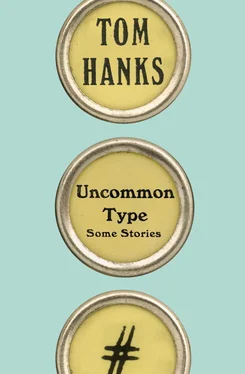“I’m hoping you can save my investment,” she said. She laid the leatherette case on the counter. She unclasped the case and produced the typewriter. The old man let out a sigh at the sight of it.
“I know,” she said. “This gem needs work. Half the keys are gummed up. It rocks when I type, and the space bar is kablooey. And no bell.”
“No bell,” he said. “Ah.”
“Can you help a girl out? I have five bucks sunk into this thing.”
The old man looked at her, then back at the machine. He let out another sigh. “Young lady, there is nothing I can do for you.”
She was confused. From what her eyes took in, this was the place to get a typewriter back into working order. On the workbench behind the old man she could see disassembled machines and parts of typewriters, for crying out loud. “Because none of those parts back there match my typewriter?”
“There are no parts for this,” he said, waving his hand over the dull red typewriter and leatherette case.
“You’d have to order some? I can wait.”
“You don’t understand.” On the edge of the counter was a little case for his official business cards. He took one and handed it to her. “What do you read on this, young lady?”
She read the card. “DETROIT AVENUE BUSINESS MACHINES. Printers. Sales. Service. Repair. Closed Sunday, which is tomorrow,” she said. “Office Hours nine a.m. to four p.m. Saturdays, ten a.m. to three p.m. My watch and your clock both show twelve nineteen.” She turned the card over. Nothing on the back. “What am I getting wrong?”
“The name of this shop,” the old man said. “Read the name of my shop.”
“Detroit Avenue Business Machines.”
“Yes,” he said. “Business Machines .”
“Okay,” she said. “Yeah.”
“Young lady, I work on machines. But this ?” Again, a wave of his hand over her five-dollar typewriter. “This is toy .” He said the word like he was cussing: turd .
“Manufactured of plastic to look like a typewriter. But this is not a typewriter.”
He detached the lid on the top of what he called a toy, the plastic bending until it came off with a snap to reveal the workings inside. “The typebars, the levers, the ribbon spools—plastic. The ribbon reverse. The vibrator.”
She had no idea there was a vibrator in a manual typewriter.
He banged on some of the keys, flipped levers, slid the carriage back and forth, spun the platen, hit the backspace key, all in disgust. “A typewriter is a tool. In the right hands, one that can change the world. This? This is meant to take up space and make noise.”
“Can you at least give it a little oil so I can take a whack at changing the world?” she asked.
“I could clean it, oil it, tighten every screw. Make the bell ring. Charge you sixty dollars and sprinkle fairy dust upon this typewriter. But I would be taking advantage of you. In a year, the space bar would still be…”
“Kablooey?”
“Better you take it home and put a flower in it.” He slid the typewriter back into its carrying case, like he was wrapping a dead fish in newspaper.
She felt bad, as though she had disappointed one of her teachers with a lazy effort, handing in a poorly structured essay. If she had still been with the Knothead, he’d be standing next to her agreeing with the old man, saying, “I told you the thing was a hunk of junk. Five dollars? Gone!”
“Look here.” The old man waved his arm at the typewriters that lined the wall-mounted shelves. “These are machines. They are made of steel. They are works of engineers. They were built in factories in America, Germany, Switzerland. Do you know why they are up on that shelf right now?”
“Because they are for sale?”
“Because they were built to last forever!” The old man actually shouted. In him, she heard her father hollering, “Who left those bikes on the front lawn?… Why am I the only one dressed for church?…The father of this house is home and needs a hug!” She realized she was smiling at the old man.
“This one,” he said, moving to the shelves. He took down a black Remington 7 typewriter, a model called Noiseless. “Hand me that tablet, there.” She found a pad of blank paper on the counter and gave it to him. He ripped off two pages and rolled them into the gleaming, shining machine. “Listen.” He typed the words

The letters whispered onto the page one by one.
“America was on the move,” he said. “Work was being done in crowded offices, small apartments, on trains. Remington had sold typewriters for years and years. Someone said, ‘Let’s make a smaller, quieter machine. Bring down the racket.’ And they did! Did they use plastic parts? No! They reengineered the tension, the force of the keystroke. They made a typewriter so quiet it could be sold as noiseless . Here. Type.”
He spun the machine to face her. She pecked out

“I could hardly hear a thing,” she said. “I’m impressed.” She pointed to a two-tone machine, bone white and blue with a rounded body. “How quiet is that one?”
“Ah. A Royal.” He replaced the black Remington 7 and pulled down a gorgeous little writing machine. “A Safari portable. A decent piece of work.” He rolled in two more sheets of paper and let her go at the keys. She thought of safari-themed words to type.



The machine was louder than the Noiseless and the keys did not fly as effortlessly. But there were features on the Royal that postdated the engineering of the Remington. The number 1 with an ! A button that said MAGIC COLUMN SET. And, it was two-tone!
“Is this bit of Royalty for sale?” she asked.
The old man looked at her with a smile and a nod. “Yes. But tell me. Why?”
“Why do I want a typewriter?”
“Why do you want this typewriter?”
“You trying to talk me out of it?”
“Young lady, I will sell you any typewriter you want. I will take your money and wave you goodbye. But tell me, why this Royal Safari? Because of the color? The typeface? The white keys?”
She had to think about it. Again, she felt like she was in school, about to take a test she could fail, a pop quiz when she hadn’t done the reading.
“Because of my fickle taste,” she said. “Because I brought that toy typewriter home and got to thinking I would like to write on a typewriter rather than in pen and pencil but the dang thing is gummed up and guess what? My local typewriter shop refuses to touch it. In my mind, I see myself at my little table in my little apartment, pecking out notes and letters. I own a laptop, a printer, an iPad, and this, too.” She held up her iPhone. “I use them as much as any modern woman does, but…”
She stopped. She was thinking now, about what it was that had moved her to buy a five-dollar typewriter—one with an unreliable space bar and no bell—and why she was now in this shop more or less arguing with an old man, when just the day before she’d had no opinion whatsoever about old manual typewriters.
Читать дальше
















